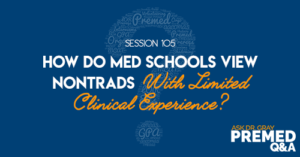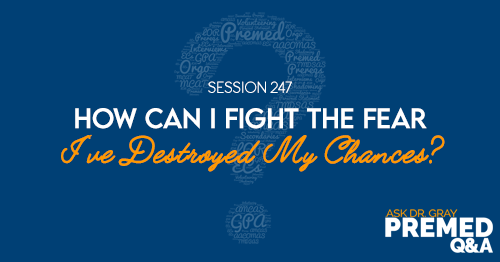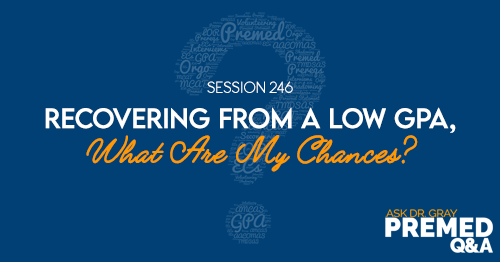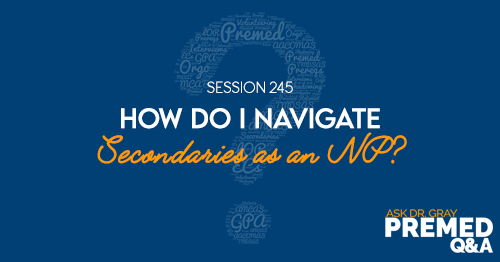Apple Podcasts | Google Podcasts
Session 105
How do medical schools view nontraditional students with limited clinical experiences due to other commitments? Let’s discuss the importance of this topic!
Our episodes are recorded live on Facebook at 3 pm ET on most weekdays. Like the page to be notified.
For more help on your medical school application, check out The Premed Years Podcast.
[00:23] Question of the Day
Q: “For nontrads with limited time, how do medical schools view those limited extracurriculars we get, particularly when it comes to clinical experience?”
A: It’s always that tricky predicament. A few episodes ago, I had a stay-at-home mom who’s not doing anything except being a mom. And how’s that going to look?
“The goal of this whole process is to prove to yourself why you want to be a physician. Then translate that for medical schools to show them why you want to be a physician.”Click To TweetA lot of students take this whole checkbox thought process and think they need to check all the boxes for the medical schools. But in reality, it’s all for you. And so, if you aren’t doing a lot, if you’re worried about what you’re doing, how are you proving to yourself that this is what you want? Or is it just some dream that you had since you were a kid? So you’ve got to check in with yourself first.
[01:30] Limited Time as a Nontrad
Q: “After I had my daughter, I had some experiences with my physicians in the hospitals. And that was kind of my seed for wanting to be a doctor. And then I shadowed since then. But as far as getting more clinical experience and shadowing, I haven’t had any luck, because of my limited daycare schedule, I just don’t have time.”
A: That’s going to be an issue. You can’t apply to medical school and say you want to be a physician and you haven’t really done anything. Again, it’s not for them. This process is for you. Why do you want to be a physician?
Having a good experience, or in some cases, a bad experience with physicians wants to propel people to be physicians. But a lot of times, when you go and get that follow up exposure and experience, sometimes, some might find that it isn’t what they thought it was. And then they go off doing something else. So you see, you’re holding on to this idea of wanting to be a physician from very limited exposure.
So I encourage you to force yourself to utilize every resource in the book, to be able to go out, and get some more exposure. That way, your reason for wanting to be a doctor is just because you had a doctor and you had a good or bad experience with the doctor and so you decided to be a doctor. Plus, that was four years ago and you haven’t really done anything since.
[03:19] Limited Exposure Due to COVID
Q: “I’m actually volunteering at a clinic, but they’re not letting us be anywhere near patients, obviously, because of COVID. I’m living in Wyoming, it’s very rural here. There’s not a whole lot to do and then the hospital wants very specific shifts that I haven’t been able to work in.”
A: It’s definitely a challenge, especially being a mom, especially during COVID especially being in a rural environment where there isn’t a hospital on every corner. And so, at some point, you have to just make some changes in your life to potentially figure out how to do it.
It doesn’t mean you can’t get into medical school with very limited experience. Maybe an admissions committee will understand those circumstances. They’d probably see that you’ve shown enough in these other places that they’re willing to give you a chance. But again, from an admissions standpoint, your future life is all predicated on a very small sample set. The last thing you want is realizing once you get into a residency that this is not what you really want.
'You need clinical experience for you – not for the medical schools.'Click To Tweet[05:02] Finding Clinical Experiences
Q: “What do you think about ski patrol for clinical experience?”
A: Ski patrol is a branch off of emergency medical services. It’s cool and it’s different. You’re interacting with people who fall and hurt themselves. It’s a good experience. It’s not the most clinical of clinical experiences, but it’s an EMS type of experience that would challenge you to go seek out especially being in a rural environment.
Go seek out the smaller family practice clinics and see if you can volunteer as a medical assistant or something like that. Probably, they’re not going to have the rules in place around COVID. They’re still seeing patients in the clinic. And they may be more flexible with having someone come in wearing a mask and all the other proper precautions so that you can get some experiences that you may need. Maybe they’d be more flexible around what you need.
[06:23] Possible Clinical Experiences
Q: “I’ve talked to a couple of clinics around here. So far, they’re not letting people in. I live in a university town. There are 80% of the clinics here. The last clinic is just a nurse practitioner clinic. So I haven’t asked there. I’ve shadowed at least once every six months.”
A: It’s perfectly fine to ask an NP clinic. You’re not shadowing the NP. You’re interacting with patients. That’s the goal of what you need to do. It sounds like you’d mentioned that you’re doing a little bit of shadowing here and there.
It’s good that your shadowing experience is consistent. So it’s really that clinical experience. Think about going to a hospice. Maybe there’s a potential change in risk tolerance there to where they’re allowing people into homes and be able to get those experiences. So look at that.
And then outside of that, especially right now during COVID times, look to things like crisis hotlines, text hotlines, and those kinds of things. Historically, it isn’t considered clinical experience. But right now, when it’s really the only thing possible, maybe look at that as well.
A lot of students put pharmacy tech as clinical experience but I’m not a fan of putting that as clinical experience.
[10:26] Taking the MCAT
Q: “I’m studying for the MCAT right now. I have a 4.0 GPA, but I’m not being super great on MCAT stuff. I just started a few months ago, and I haven’t been able to just focus on that because I was taking two summer courses. And now I’m in courses again, and then with daycare being up in arms because of COVID and all. So I was just wondering, with a GPA like mine, should I shoot for a 505 and be cool with that?
A: You obviously want as high as an MCAT as possible. But you have to balance that with the fact that you also need to also apply. So it’s not like you can study for 10 years and finally get that 528. You just need to continue studying. You still have a lot of time ahead of you when you are going to take it.
Having proven yourself already as a good student, at least from a GPA perspective, you have some innate ability to study and do well on tests. Now it just needs to translate to the MCAT specifically. So continue working on it.
[13:09] What is High Yield Protection?
When you’re using a school as a ‘safety’ school, and they all look good on paper, but it’s not fit for the school. This is what they usually mean by yield protection. It’s from the schools passing over really high-quality candidates because they’re just not good fits for the school. And because they don’t think they’re actually going to go to that school.
“There are lots of reasons why a student gets an interview and doesn't get an interview, and gets an acceptance, and doesn't get an acceptance.”Click To Tweet[15:37] Putting Shadowing in a Personal Statement
“Shadowing in is usually the weakest story in a personal statement because shadowing is so passive.”Click To TweetShadowing is really not that impactful enough to prove that you need to be a physician. It typically leads to when you’re writing about it in a personal statement. So I challenge you to not write about shadowing in a personal statement, which will leave you probably with nothing else to write about. That being said, it’s too early to write your personal statement. So I would stop worrying about writing your personal statement. I typically don’t recommend starting to write it until January of the year you’re applying anyway.
Links:
SEARCH SITE
LISTEN FOR FREE












